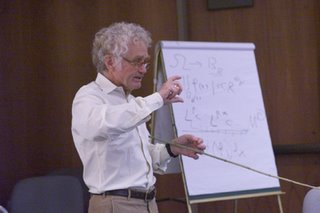Me and Michael Fix Civilization Up

Michael Nagler (see photo) gave a talk before signing books at Black Oak Books tonight. I hadn’t seen him for twenty years or so, though I had met some students who have worked with him. He’s emeritus too, and I gather he lives in an ashram, I think in Marin County. He is adviser for a magazine at UC exactly like mine . In his speech he mentioned the changes that took place during the sixteenth century that made western civilization explode into worldwide dominance. But that dominance is at an end, he said. We have to stop it.
During the question period after his speech, I felt compelled to introduce myself and announce that the argument of my own new book is almost exactly the opposite of his. He greeted me warmly, and we debated for about ten minutes about two issues. My main objection was to his categorical dismissing of the mass media. Michael believes that all the world’s looming calamities result from one single cause: the “spiritual crisis” that his friend Michael Lerner also locates at the root of all our troubles. And this spiritual crisis is caused by the mass media. He believes, therefore, that the only solution is to “abstain” from the mass media, with its advertising, which inevitably makes one materialistic, greedy, and ready to use violence against others. Only by avoiding it can we gain the opportunity to create culture of nonviolence
I said that the mass media do not rot the brain. No medium is inherently either good or bad, for everything depends on its content. Nor do we need to fear “fantasies,” for fiction is a great way of transmitting great new ideas. Almost all television is dreadful — we agree on that – but the point is to figure out how to fix it, for it is the most under-used and yet most powerful resource in the world for getting new messages out. Today there was an article in the newspaper demonstrating that television does not harm the academic performance of children overall. In fact, the performance was slightly higher among children who had been exposed early to television. But the article refers to a critic of this research who pointed out its undiscriminating nature. The truth is that television may be good or bad.Violent TV does influence children to be more aggressive, but very good programming has extremely beneficial effects. It’s not the medium itself but rather its contents that matter. And, as I pointed out to Nagler, his top priority is to spread the practice of nonviolence, and the best example of that is the fall of communism all around the world in 1989. That was largely influenced by the film Gandhi. The leaders of those movements studied it closely to learn Gandhi’s nonviolent methods of resistance. Michael conceded the point.
There wasn’t time for me to critique his other point, but I mentioned the fact that he is critical of Gene Sharp’s approach to nonviolence because it does not require any spiritual prerequisites. I agree with Sharp. I’m not sure that spirituality is required to be effective in nonviolent resistance. Training and strategic savvy are required, but one can do that from a purely pragmatic perspective. I knew that this dispute will have to be carried on over coffee, not in the Black Oak bookstore, so I just bought one of his new books and agreed to meet him on a Tuesday or Thursday after class. I'll take some copies of Peace Magazineto give him when we meet. It was a useful and friendly exchange of views.












